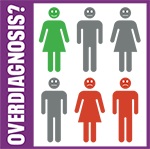Overdiagnosis: The diagnostic challenges in long Covid


As part of our series on potential overdiagnosis, GP partner and trainer Dr David Coleman explores the evidence-based approach to diagnosing long Covid and advises on how to best support patients with symptoms while avoiding potential harms from an inaccurate diagnosis
Covid-19 — the disease associated with SARS-CoV-2 infection1 — barely needs an introduction. The pandemic and its lingering impact on all aspects of society are still fresh in everyone’s minds. The term ‘long Covid’ was coined by a patient in May 2020 as a Twitter hashtag.2 Its use increased as more patients across the world struggled with persistent unexplained symptoms after an acute Covid-19 infection and the term became accepted before it had truly been defined.
NICE defines long Covid as ‘a multi-system condition with a range of debilitating symptoms’ following an acute Covid-19, which ‘continue for more than 4 weeks, and are not explained by an alternative diagnosis’.1
It is an umbrella term, which consists of a number of different clinical syndromes and includes ongoing symptomatic Covid-19 infection (4-12 weeks) and post-Covid syndrome (>12 weeks).
Reported prevalence
The last available data from the Office of National Statistics (March 2023) suggested that 1.9 million people living in private households in the UK (or 2.9% of the population) were experiencing long Covid as of 5 March 2023.3 Of these, 1.3 million had experienced symptoms for over one year and 762,000 for over two years.
Common features
Patient’s experiences of long Covid are highly variable. An extensive range of clinical features have been described, from generalised symptoms such as fatigue, pain and fever, to more organ-specific symptoms clusters, eg, cardiovascular (chest pain, palpitations), respiratory (cough, exertional breathlessness) and neurological (cognitive impairment, headache, autonomic dysfunction, neuropathy).1,4
Symptoms can be persistent or may fluctuate as patients suffer exacerbations. Psychological symptoms such as low mood and anxiety have also been attributed to long Covid. Some patients present with multi-organ effects or autoimmune conditions.1
The exact underlying cause of long Covid remains unclear, although chronic inflammatory processes, multi-organ microvascular damage, effects on the autonomic nervous system, and auto-immune causes have been cited as contributory factors.4
Diagnostic challenges
There are no clear diagnostic criteria for long Covid. A positive Covid-19 test is not formally required; NICE recommends that the suspicion alone is enough for the clinician to consider long Covid. 1 A thorough history and physical examination should be followed by tailored investigations based on the patient’s clinical features, to exclude relevant differential diagnoses.
While it’s impossible to say for sure whether there truly is a problem with overdiagnosis of long Covid, the converse is equally true; in the absence of a reliable diagnostic test we just don’t know to what extent long Covid is being accurately diagnosed. We know patients have always presented with generalised symptoms that we are unable to explain; post-viral fatigue is well established too. It stands to reason that not every presentation of these symptoms since 2020 will have been caused by Covid-19, but Covid-19 has been at the forefront of our minds (especially in 2020 and 2021) so it’s only natural that it features highly in terms of patient ideas about their illness.
It’s become something of a polarised topic, with supporters advocating a low threshold for diagnosis and validation of the patients experience, and sceptics expressing concern over unclear case definitions and diagnoses being made without firm evidence of Covid-19 infection.4,5 Furthermore, some epidemiological studies have been criticised for neglecting to include control groups.5
In many ways the response mirrors the polarisation seen in relation to Chronic Fatigue Syndrome (CFS) and Myalgic Encephalomyelitis (ME), conditions that overlap long Covid significantly.
I think it’s perfectly possible and very reasonable to be concerned about potential overdiagnosis and the harm this can cause, while also being sympathetic to the wide-reaching effect that symptoms which may or may not be related to long Covid can have on patients. We probably all know colleagues who have been affected, and media reports have offered a sobering insight into the human impact on the medical profession alone.6,7
Consider ‘watchful waiting’
That said, I do believe we should exercise caution in our approach to patients with milder non-specific symptoms (especially in the absence of a positive Covid-19 test). Over-investigation fuelled by a heavy focus on excluding all manner of rare conditions runs the risk of doing more harm than good; identification of incidental findings can lead to potentially unnecessary interventions and place added stress on the patient at the centre of the case. Then there is the issue of cost and further pressure on a secondary care system that is undeniably creaking.
We can validate patient’s experiences and empathise with them without bestowing a potentially inaccurate label on them. In the absence of any clear treatment regimens, with management mostly focused on symptom management, I would often advocate for keeping long Covid as a differential in the absence of a strong history and a more specific symptom cluster. I would especially do so in cases without a positive Covid-19 test. We should also consider the impact of placing a diagnostic label on individual patients; some may find it comforting, while others may be distressed to be told they have a new and poorly understood condition. Given the uncertain timeline and outlook of long Covid, I’ve found the majority of patients are happy to adopt a watchful waiting approach.
Supporting the patient’s next steps
I previously wrote an overdiagnosis article about vitamin B12 deficiency. With that diagnosis, it is very easy to go back over the test results and identify patients who have been misdiagnosed. Long Covid presents an entirely different challenge.
It would certainly be worthwhile looking at your clinical systems to identify how many patients have been coded as having long Covid or a related condition. It is likely to be significantly lower than the prevalence suggested by the ONS data as not all patients who feel they have long Covid will have consulted us.3 Practices could do some focused work with this cohort of patients to see how they are getting on and to explore their thoughts about the diagnosis.
Evaluating how many diagnoses were informed by confirmed acute Covid-19 infection could be useful in terms of supporting ongoing discussions, although clinicians should be mindful of NICE’s guidance that this is not required.
Crucially, we must not forget that many patients are suffering debilitating symptoms and symptom clusters, which regardless of cause are affecting their lives. Earlier this month a group of healthcare workers escalated their battle for compensation to the High Court;8 their individual stories are a strong testament to the potential severity of this condition and its impact. A dogmatic crusade in the name of accurate diagnosis may cause as much harm as overdiagnosis. A balanced, supportive approach with a degree of caution is likely to pay dividends here.
Dr David Coleman is GP partner and trainer and PCN clinical lead in south Yorkshire
References
NICE. CKS Health topics: Long-term effects of coronavirus (long COVID). 2022
Perego E et al. Why the patient-made term ‘long Covid’ is needed. 2020
ONS. Prevalence of ongoing symptoms following coronavirus (Covid-19) infection in the UK. 30 March 2023
Greenhalgh T et al. Long Covid – An update for primary care. BMJ 2022;378:e072117
Høeg TB, Ladhani S, Prasad V. How methodological pitfalls have created widespread misunderstanding about long Covid. BMJ Evid Based Med; Published online 25 September 2023
Parr E. BMA calls for financial support for doctors with long Covid. Pulse; 4 July 2023
Waters A. Long covid: the doctors’ lives destroyed by an illness they caught while doing their jobs. BMJ 2023;382:1983
Burns C. Long Covid: Health staff go to court for compensation. BBC News; 6 March 2023
Pulse October survey
Take our July 2025 survey to potentially win £1.000 worth of tokens

Visit Pulse Reference for details on 140 symptoms, including easily searchable symptoms and categories, offering you a free platform to check symptoms and receive potential diagnoses during consultations.










